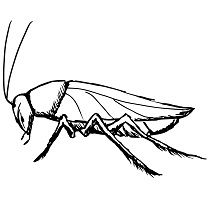Article
Suppressing Pest-Induced Asthma through Bacteria Injections
Author(s):
The so-called “hygiene hypothesis†holds that lack of exposure has made developed populations more allergic and asthmatic. Though using exposure shows promise as a preemptive approach to reducing risk for allergen-induced asthma, the window for its implementation is small.

The so-called “hygiene hypothesis” holds that, along with the many medical gains made through modernization and enhanced cleanliness, the subsequent lack of exposure has made developed populations more allergic and asthmatic. Without gaining immunity to various microbes at the earliest stages of life, thousands upon thousands of Americans were doomed to suffer diseases spurred by later exposures to them.
Common pests are often associated with the existence and exacerbation of asthma. Cockroaches, whose allergens the National Pest Management Association say can be found in 63% of American homes, are a major culprit.
Testing the ability of early exposure to hinder later reactions to allergens, University of Alabama at Birmingham researchers used another common pest, mice, to gauge resistance to cockroach-induced asthma. Newborn mice were injected with Enterobacter bacteria that specifically expressed alpha-1,3-glucan on molecular surfaces. For comparison, other cohorts of mice were injected with purified alpha-1,3-glucan and Enterobacter that did not express alpha-1,3-glucan.
The findings seemed to show that the alpha-1,3-glucan could bind to B receptors in the mice’s lungs, preventing the release of reactive antibodies that manifest as allergic or asthmatic symptoms open exposure to cockroach-derived allergens. Similar reactions to, say, material from dust mites might be blocked at different pathways by an equivalent method.
Though the preemptive approach to reducing risk for allergen-induced asthma shows promise, the window for its implementation is small. Speaking in a press release that touted the study’s publication, John Kearney, one of its authors, said that “We do not see protection if we immunize the adults. The exposure has to happen early — in human equivalents, probably within the first two years.”
The hygiene hypothesis, decades-old, is neither widely accepted nor widely discredited as the root of asthma and allergic conditions (particularly because a great many cases of asthma are non-allergic). Still, studies relating increased hygiene to increased risk—and, as such, the benefits of early exposure—appear quite regularly. Studies have sought to see if the allergen-rich environments of Amish homes decrease asthma rates, and another study released just last week saw Australian researchers attempting to link a protein secreted by hookworms to a reduced incidence of asthma.
Related Coverage:
“Hookworm Soup” a Potent Asthma Solution?





